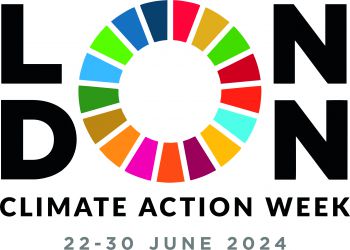What I learnt at London Climate Action Week
Posted on behalf of: Sourajit Aiyer
Last updated: Wednesday, 7 August 2024

With every year turning out to be the hottest year yet, and growing incidences of extreme and erratic rain, cyclones, wildfires, floods, droughts owing to imbalances in climate-induced air and moisture patterns, climate change is a visible reality today. The environmental aspects of climate change have a social impact, causing severe loss and disruption to livelihoods and business continuity, climate-led distress migration, and fall in income and economic growth. Climate change is no longer something that may occur in the future, but something that is occurring right now. Therefore, corrective action is an urgent imperative.
Stakeholder-led initiatives for climate action
Climate action has turned out to be an inter-disciplinary and inter-stakeholder area of work. In response, various stakeholder-led initiatives have come up globally, adding to the activities arranged by the United Nations. The Climate Week New York is a fortnightly event every September, as are the London Climate Action Week and Singapore Ecosperity events every summer.
London Climate Action Week (LCAW)
It was ironic the week of LCAW 2024 saw one of the hottest summers that London has ever seen, immediately followed by a reduction in the temperatures across the country. The LCAW event itself has been conducted annually since 2019, curated by the think-tank, E3G, and the London Mayor’s office. It aims to generate insights and discussion on global climate action, namely managing the policy for a 2030 climate ambition roadmap, mechanisms to mobilise finance to transition the global economy towards a low-carbon model, shifting the UK towards net-zero emissions, and ways to mobilise societies towards climate action. The LCAW has become one of the largest independently organised gathering of professionals working on climate action. The event organisers are typically climate think-tanks, research institutions and international agencies, or even the private sector like associations, corporates and financial institutions. The events include panel discussions, campaigns and celebrations, and typically convene speakers and delegates, each of whom is a subject matter-expert. This provides a collaborative and inclusive platform for sharing of knowledge, ideas and insights.
Key learnings for climate enthusiasts
The 2024 edition of LCAW saw events curated by Climate Group, IIED, TNFD, World Green Building Council, IEEFA, IFRS Foundation, amongst others. These events were a good opportunity to interact with senior C-suite management of organisations that are leading the work around climate action.
An emphasis was on the role of business towards climate action. Business sectors like oil and gas, power, infrastructure, chemicals, agriculture, transport, construction, etc. continue to remain amongst the highest emitters of greenhouse gases worldwide, contributing to climate change by raising the planet’s average land temperate already by 1.6oC over certain surfaces, from pre-industrial levels. While this number may sound small, even a 1oC change implies significant ramifications for society.
The events saw the global narrative stress on the findings from the recent COP28 event (the flagship annual event organised by the UN Framework Convention on Climate Change). It had been agreed during the COP28 that nations need to revise their nationally determined contributions to reduce their national emissions, given the dismal level of change achieved since the 2015 Paris Agreement to maintain the planet’s temperature rise to within 1.5oC above pre-industrial levels by 2100.
The discussions also emphasised the importance of driving green industrial policies across countries, which would create an enabling ecosystem to drive innovation and commercialisation of new technologies that promote low-carbon economic models. That would make them more cost-effective, thus reducing their prices relative to fossil fuel-based incumbent products, and building the business case for the global economy to transition towards low-carbon solutions. This is even more important for low-income developing nations, which bear disproportionate vulnerability to climate shocks but lack the resources, technology and adaptive capacity to respond to such shocks.
The financing thematic events saw stakeholders from different categories of institutions coming together; for example, venture capitalists who invest in early-stage solutions, fund managers that invest in enterprises that have seen a track-record of operational performance, and banks and large bond investors that invest in more mature enterprises that have predictable cash flow streams. The array of green solution providers lies across this entire spectrum, making all kinds of financial stakeholders a relevant audience indeed.
The topics of measuring and managing nature-related risks was another key theme, aside from climate risks. That is because almost half of global GDP is connected to natural resources in some form or the other, and nature is again closely intertwined with the impact on climate.
Going ahead
The consensus action from the LCAW was to nudge leaders to convert pledges and plans into practical action, designing investments that would capture market opportunities while driving impact, enhance the resilience of business models and assets, using disclosures as a strategic tool and not just to churn out data, and pursue collaborative initiatives for mutual benefits.
For more information, please contact the LCAW organising team to inquire about the June 2025 edition.
Sourajit studies Sustainable Finance as his passion lies in climate change. He loves sunny days, sunny moods and sunny strolls, but is also game for a serious talk when needed.

